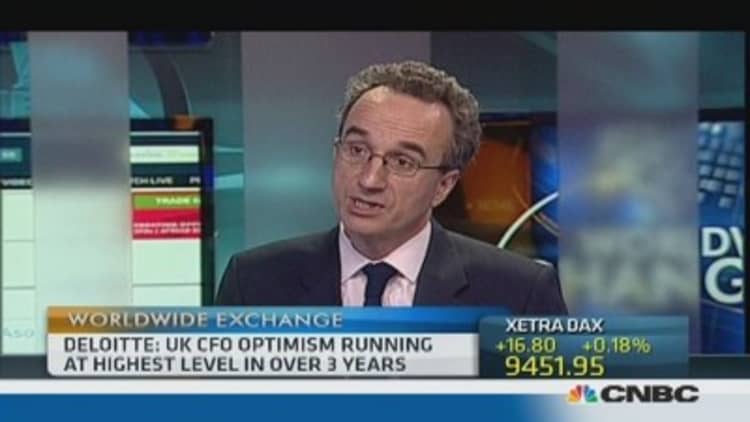U.K. Finance Minister George Osborne warned on Monday his Conservative Party will seek a further £25 billion ($41 billion) in budget cuts if it is re-elected to govern next year, sticking with heavily-criticized austerity even as the economy improves.
The choice between increased government spending or tough belt tightening has sparked one of the most contentious debates in economics in recent years. But advocates of the latter have again received the backing of the U.K. government.
Osborne and Prime Minister David Cameron highlighted that pensions would more than likely be immune from any cuts, but suggested welfare budgets would not be so lucky.
"Government is going to have to be permanently smaller – and so too is the welfare system," Osborne said at the speech on Monday, indicating that £12 billion of the cuts would be on welfare.
(Read More: UK manufacturing tipped for major turnaround)
"It should not be a welfare system that offers up benefits as a lifestyle choice. We need to be fair to those who need our welfare system – and fair to those like you who pay their taxes for that system."
Critics rounded on Osborne for being ideological, protecting his party's core vote by leaving pensions untapped and also favoring high earners over the poor. His opposite number Ed Balls from the Labour Party said that a Labour win at the next elections would mean the deficit would be reduced in a "fair way".
"(We'll) not give tax cuts to millionaires. And we know that the way to mitigate the scale of the cuts needed is to earn and grow our way to higher living standards for all," he said in a press statement after Osborne's speech.
The global financial crash of 2008 coincided with a change of government in the U.K. With the left-leaning Labour Party ousted by its right-wing rivals in 2010. The majority-led Conservative government embarked on a tight austerity package shortly afterwards instead of calls by Keynesians for more spending to boost demand and aid recovery.
(Read More: UK's Osborne to stress job not done on budget)

Gross domestic product figures for the U.K. have shown a slight upturn in recent quarters. The Office for National Statistics said in December that the economy had expanded by 0.8 percent in the third quarter. But Britain's balance of payments continues to disappoint, with the nation's current-account deficit - a measure of a country's global trade as well as profits overseas - widened to 5.1 percent of overall GDP, the widest since 1989.
Public sector net borrowing - often used a key indicator for a government's deficit - reached £157 billion in 2009/10 and has continued to fall lower over the years with the government aiming for a deficit of no more than £120 billion this financial year.
The Organisation for Economic Co-operation and Development (OECD) remains optimistic on the U.K.'s prospects, significantly upgrading its growth outlook on the country in a November report. A business survey by Lloyds Bank on Monday said that confidence in the sector has hit a 20 year high, fueling hopes of continued growth in the first half of 2014.
(Read More: UK house prices soar: Biggest jump in 4 years)
The prospects are high but Osborne has refused to offer the "job done" victory speech, instead urging voters to give him another term in government to "finish the job".
"I'm confident about the improvement we are seeing in the economy, but we've got to stick to that plan," he said.
"There is still a long way to go – and there are big, underlying problems we have to fix in our economy."
—By CNBC.com's Matt Clinch; Follow him on Twitter @mattclinch81


